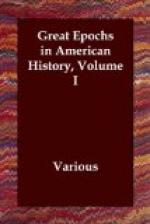When Alexander VI issued his bull the America which Columbus had found was believed to be not a new continent, but the Indies, and the Portuguese, who had reached India by way of the Cape of Good Hope, were threatening to send an expedition across the Atlantic to take possession and dispute the Spanish claims. It was in these circumstances, and for the purpose of reconciling the rival states that Alexander issued the bull, John Fiske has said that, “As between the two rival powers the Pontiff’s arrangement was made in a spirit of even-handed justice.” The bull conferred on the Spanish sovereigns all the lands already discovered, or thereafter to be discovered in the western ocean, with jurisdiction and privileges In all respects similar to those formerly bestowed upon the crown of Portugal.
Alexander VI, the famous Borgia Pope, who was the father of Caesar Borgia and Lucretia Borgia, has been accused, somewhat loosely, of committing an act of foolish audacity in making this grant. He has been represented as having partitioned the whole American continent between Spain and Portugal. The accusation is quite unjust. The bull merely granted such lands as had been discovered, or might yet be discovered, and these lands were not understood to be those of a new continent, but parts of India not heretofore explored. As for any rights possest by other European countries, including England and France, those countries at that time had little, if any, interest in the discovery made by Columbus or, in fact, any actual knowledge of it.
THE DISCOVERY OF THE MAINLAND BY THE CABOTS
(1497)
I
The account given by John A. Doyle[1]
As early as the reign of Edward iii, sailors from Genoa and other foreign ports had served in the English navy. The increasing confusions of Italy after the French invasion naturally tempted her seamen to transfer their skill to the rising powers of western Europe. Among such emigrants was John Cabot, a Venetian, who settled in Bristol, and then, after a return to his own country, again revisited his adopted city. Of his earlier history and personal character we know nothing. Our own records furnish nothing but the scanty outlines of his career, and the one glimpse of light which is thrown upon the living man is due to a lately discovered letter from his countryman, the Venetian ambassador. Of his son, Sebastian, we know more. He was born in Bristol, returned with his parents to Venice when three years old, and revisited England as a boy or very young man. His features, marked with the lines of thought and hardship, still live on the canvas of Holbein; and one at least of the naval chroniclers of the day writes of him in the language of warm personal affection.




